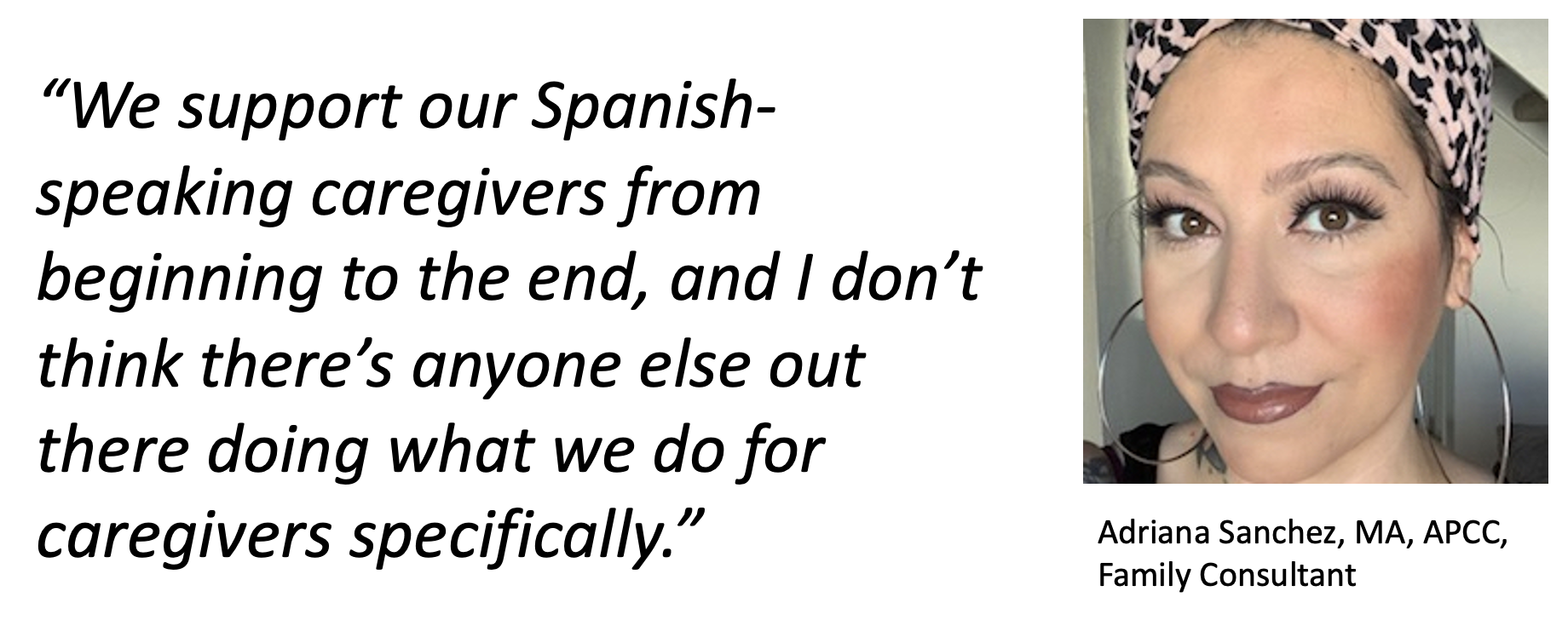For Spanish-speaking Caregivers, FCA Offers Education, Advocacy, and Self-Care Support
June 2, 2021
Q&A with Adriana Sanchez, MA, APCC, Family Consultant
In our primarily English-speaking health care and legal systems, Spanish-speaking family caregivers may find themselves overwhelmed, poorly served, and even mistreated. Fortunately, FCA offers compassionate, evidence-based assistance and support in Spanish at no cost.

Family Consultant Adriana Sanchez, who has a master’s degree in clinical counseling, provides Spanish-language services to family caregivers in the San Francisco Bay Area. A passionate community advocate, she has assisted family caregivers with assessment, counseling, education, and support since 2017.
Here, Adriana talks about her role and how she works with caregivers.
Please note: The enhanced services mentioned below are offered to qualifying family caregivers in the six counties where FCA partners with health departments and agencies (Alameda, Contra Costa, Marin, San Francisco, San Mateo, and Santa Clara). To learn more about these services, read an online brochure.
How does FCA support family caregivers who primarily speak Spanish?
We give Spanish-speaking caregivers a space where they feel supported. For those living in the San Francisco Bay Area counties where FCA offers enhanced services, we walk them through the health care and legal systems, offer guidance, and even advocate on their behalf. They can ask questions about caregiving and their rights as a caregiver.
I offer short-term counseling to address caregiver burnout, and I run a telephone support group in Spanish. We also have classes and workshops as well as videos and prerecorded webinars in Spanish.
We support our Spanish-speaking caregivers from beginning to the end, and I don’t think there’s anyone else out there doing what we do for caregivers specifically.
Can you tell us more about your approach to working with Spanish-speaking caregivers?
I meet caregivers where they are. I’m professional but not stuffy. I make sure my demeanor is relaxed and friendly, so they open up. They need to connect with me so they feel comfortable reaching out for help.
Most of my caregivers tell me when they talk to a medical social worker, they just get bunch of paper work. They get a list of numbers to call and nothing is explained. The focus is on the patient, with nothing for the caregiver.
When I work with caregivers, I tell them, “Let’s focus on the primary issue and I’ll help guide you through this.” It’s an alternative to just giving someone way too much information. If a caregiver is already stressed out, a bunch of paperwork is not going to solve the problem.
I got into this field because I love helping people and the community. For me, anything I can do to help and be useful and empower my caregiver, that’s what I want to do. I want to be part of a solution, not add more to the problem.
What kinds of online classes and workshops are offered in Spanish?
We offer education about Alzheimer’s, dementia, stress, and depression. Classes are offered online on Zoom and Facebook Live. We cover how to be a better caregiver for the person being cared for, and we also encourage them to care for themselves. If you’re not caring for yourself, how do you care for others? Our education helps caregivers confront the disease or condition of the person in their care, manage stress, and supports them emotionally in their journey.
One of the classes I’m excited about is a 6-week series called Powerful Tools for Caregivers, which we offer to San Francisco Bay Area caregivers. It’s a weekly 90-minute class plus homework. It’s proven to improve the quality of patient care while helping caregivers better manage stress.
Another class we offer to caregivers in the Bay Area is called There Must Be a Better Way. In this 90-minute class, we go into detail about what dementia is. We offer guidance and tips on how to deal with behaviors like people not eating, sleeping, and wandering. We also have a two-hour version of the class called It Takes Two which goes into a little more detail and allows people to participate more.
Where can caregivers learn more about how FCA supports Spanish-speaking family caregivers?
Our new website is a fantastic resource. Spanish-speaking caregivers can easily find information in Spanish on our site. We also recently launched a Spanish-language bulletin called ¿Que Pasa? Read the first issue and subscribe.
For a full list of FCA’s upcoming classes, webinars and events, visit the Events section of our site.
